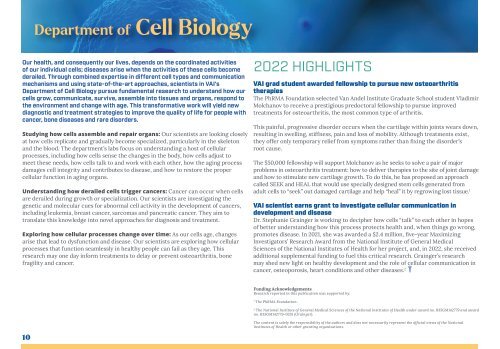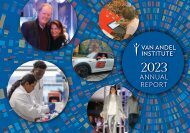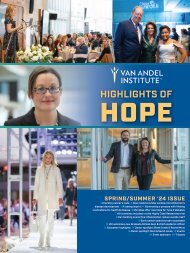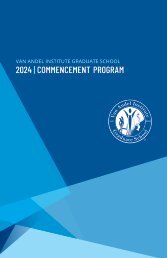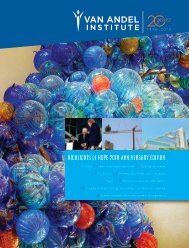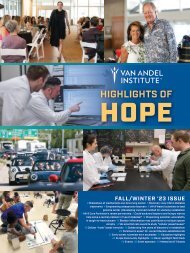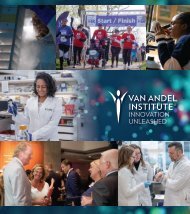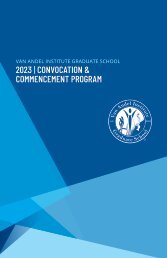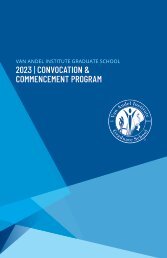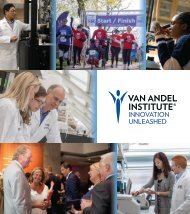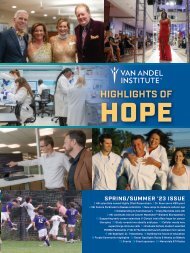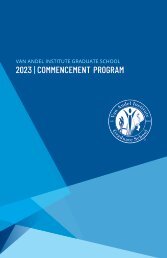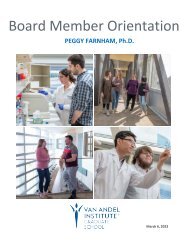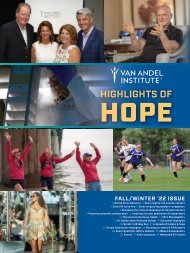2022 Annual Report
This is the 2022 Annual Report for Van Andel Institute.
This is the 2022 Annual Report for Van Andel Institute.
Create successful ePaper yourself
Turn your PDF publications into a flip-book with our unique Google optimized e-Paper software.
Department of Cell Biology<br />
Our health, and consequently our lives, depends on the coordinated activities<br />
of our individual cells; diseases arise when the activities of these cells become<br />
derailed. Through combined expertise in different cell types and communication<br />
mechanisms and using state-of-the-art approaches, scientists in VAI’s<br />
Department of Cell Biology pursue fundamental research to understand how our<br />
cells grow, communicate, survive, assemble into tissues and organs, respond to<br />
the environment and change with age. This transformative work will yield new<br />
diagnostic and treatment strategies to improve the quality of life for people with<br />
cancer, bone diseases and rare disorders.<br />
Studying how cells assemble and repair organs: Our scientists are looking closely<br />
at how cells replicate and gradually become specialized, particularly in the skeleton<br />
and the blood. The department’s labs focus on understanding a host of cellular<br />
processes, including how cells sense the changes in the body, how cells adjust to<br />
meet these needs, how cells talk to and work with each other, how the aging process<br />
damages cell integrity and contributes to disease, and how to restore the proper<br />
cellular function in aging organs.<br />
Understanding how derailed cells trigger cancers: Cancer can occur when cells<br />
are derailed during growth or specialization. Our scientists are investigating the<br />
genetic and molecular cues for abnormal cell activity in the development of cancers,<br />
including leukemia, breast cancer, sarcomas and pancreatic cancer. They aim to<br />
translate this knowledge into novel approaches for diagnosis and treatment.<br />
Exploring how cellular processes change over time: As our cells age, changes<br />
arise that lead to dysfunction and disease. Our scientists are exploring how cellular<br />
processes that function seamlessly in healthy people can fail as they age. This<br />
research may one day inform treatments to delay or prevent osteoarthritis, bone<br />
fragility and cancer.<br />
<strong>2022</strong> HIGHLIGHTS<br />
VAI grad student awarded fellowship to pursue new osteoarthritis<br />
therapies<br />
The PhRMA Foundation selected Van Andel Institute Graduate School student Vladimir<br />
Molchanov to receive a prestigious predoctoral fellowship to pursue improved<br />
treatments for osteoarthritis, the most common type of arthritis.<br />
This painful, progressive disorder occurs when the cartilage within joints wears down,<br />
resulting in swelling, stiffness, pain and loss of mobility. Although treatments exist,<br />
they offer only temporary relief from symptoms rather than fixing the disorder’s<br />
root cause.<br />
The $50,000 fellowship will support Molchanov as he seeks to solve a pair of major<br />
problems in osteoarthritis treatment: how to deliver therapies to the site of joint damage<br />
and how to stimulate new cartilage growth. To do this, he has proposed an approach<br />
called SEEK and HEAL that would use specially designed stem cells generated from<br />
adult cells to “seek” out damaged cartilage and help “heal” it by regrowing lost tissue. 1<br />
VAI scientist earns grant to investigate cellular communication in<br />
development and disease<br />
Dr. Stephanie Grainger is working to decipher how cells “talk” to each other in hopes<br />
of better understanding how this process protects health and, when things go wrong,<br />
promotes disease. In 2021, she was awarded a $2.4 million, five-year Maximizing<br />
Investigators’ Research Award from the National Institute of General Medical<br />
Sciences of the National Institutes of Health for her project, and, in <strong>2022</strong>, she received<br />
additional supplemental funding to fuel this critical research. Grainger’s research<br />
may shed new light on healthy development and the role of cellular communication in<br />
cancer, osteoporosis, heart conditions and other diseases. 2<br />
Funding Acknowledgements<br />
Research reported in this publication was supported by:<br />
1<br />
The PhRMA Foundation.<br />
2<br />
The National Institute of General Medical Sciences of the National Institutes of Health under award no. R35GM142779 and award<br />
no. R35GM142779-02S1 (Grainger).<br />
The content is solely the responsibility of the authors and does not necessarily represent the official views of the National<br />
Institutes of Health or other granting organizations.<br />
10


